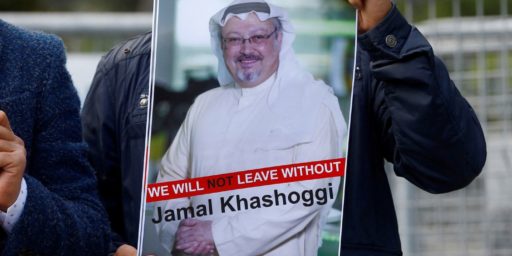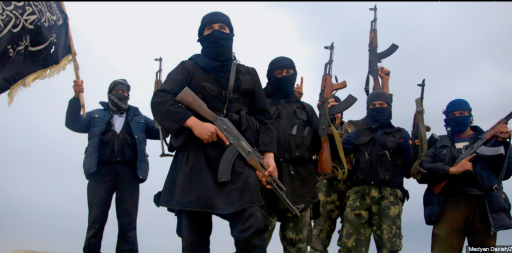Life of Terrorists Nasty, Brutal, and Short
Paul Haven observes that, despite the visible success of jihadist terrorists at killing innocents and the apparent large recruiting pool, counterterrorism forces have been quite efficient at killing their leadership and that the bench lacks the training and drive of those lost.
They rose up quickly to take up Osama bin Laden’s call for jihad, ruthless men in their 20s and 30s heralded as the next generation of global terror. Two years later, 40 percent are dead, targets of a worldwide crackdown that claimed its biggest victory with the killing of Abu Musab al-Zarqawi, al-Qaida’s front man in Iraq.
Manhunts in Asia, Africa and Europe have pushed most of the rest deep underground — finding refuge in wartorn Somalia or the jungles of the southern Philippines. While there are still recruits ready to take up al-Qaida’s call to arms, analysts say the newcomers have fewer connections than the men they are replacing, less training and sparser resources. “There are more people popping up than are being put away,” said Magnus Ranstorp, a terrorism expert at the Swedish National Defense College. “But the question is whether the new ones have the fortitude to take up the mantle and carry the struggle forward. I don’t see that they have.”
[…]
Counterterrorism officials warn that others have emerged as equally or more dangerous, and that the global fight against Islamic militancy is far from won. But tracking the fate of the “class of 2004” gives a rare insight into the landscape of Islamic militancy, and the short life expectancy of those who take up arms. Joining al-Zarqawi in the list of dead militant leaders is Nabil Sahraoui, who took over the North African Salafist Group for Call and Combat in 2004 and announced that he was merging it with al-Qaida. Sahraoui did not have much time to savor his power play. The militant, who was in his 30s, was gunned down by Algerian troops that same year east of Algiers. Habib Akdas, the accused ringleader of the 2003 bombings in Istanbul, Turkey, and another member of the class of 2004, died during the U.S. bombardment of the Iraqi city of Fallujah in November of that year, according to the testimony of an al-Qaida suspect in U.S. custody. Turkish security forces believe the account and say Akdas, who was also in his 30s, is dead. Syrian-born Loa’i Mohammad Haj Bakr al-Saqa, who has emerged as an even more senior leader of the Istanbul bombings, but who was not included in the 2004 list of top terror suspects, is in a Turkish jail awaiting trial on terror charges. Two other men who were on the 2004 list met their ends at the hands of security forces in Saudi Arabia. Abdulaziz al-Moqrin, 30, who rose from high school dropout to become al-Qaida’s leader in the kingdom, was cornered and killed by security forces in Riyadh in 2004, shortly after he masterminded the kidnapping and beheading of American engineer Paul M. Johnson. In 2005, Saudi forces shot and killed Abdelkrim Mejjati, a Moroccan in his late 30s who was believed to have played a leading role in the May 2003 bombings in Casablanca that killed more than 30 people. Mejjati came from a privileged background, attending an exclusive French school in Morocco before turning to terrorism. He was sent to Saudi Arabia on bin Laden’s orders, becoming one of the kingdom’s most wanted men.
This is followed by a long list of terrorists in hiding.
Bruce “McQ” McQuain argues that we have had substantial success at denying them permanent haven, denying them the ability to train, shutting down their financing, eliminating their connnections, and fighting back in the propaganda war. He expounds on these at some length quite convincingly.
Tim Blair quips that, “Jihadis are becoming jihasbeens” in a post entitled, “BROAD STRATA OF COMMUNITY SUFFERS HIGH DEATH RATE.”
Of course, the terrorists are also doing quite well in the propaganda war. It may be an ironic standoff a’la the latter days of the Cold War when both sides think the other side is doing quite better than they themselves think. Certainly, the Western public thinks the war in Iraq hopeless at this point, despite the constant attrition at the top ranks of the terrorist leadership.





“Join the jihad and die for a lie!”
The effect of the U.S. taking out al Zarqawi has been quick.
In Palestine, a U.S. citizen was quickly released because the “kidnappers did not want to end up like Zarqawi“.
“The Western public thinks the war in Iraq is hopeless”
This is a testament to the propaganda, lies, and anti American rhetoric spread by the Leftest MSM, the Democrats, and those in America who want to see our troops defeated in order to satisfied their hatred towards Our President.
Al Qaeda or foreign jihadis and the Iraqi insurgency aren’t the same thing, James. Although for a lot of Americans Zarqawi was the face of the Iraqi insurgency the insurgency is more diverse than that, has no centralized control, and doesn’t have a common program, strategy, or even coordination.
Dave, what a stupid statement. I wonder how you would know if there is central control or not? Seems as though they have a common goal, that being the overthrow of the elected government. If those attacks are not co-ordinated I suppose you think they are spontaneous. Hey, Ahmed, since we have nothing to do today, let us go sent off a car bomb, you drive. Any one who thinks suicide attacks are not co-ordinated is dumber than a red brick.
The problem is, that their “Life Expectancy” is not short enough.
i work with a guy who’s “nasty,brutal, and short. is he a terrorist??!!??